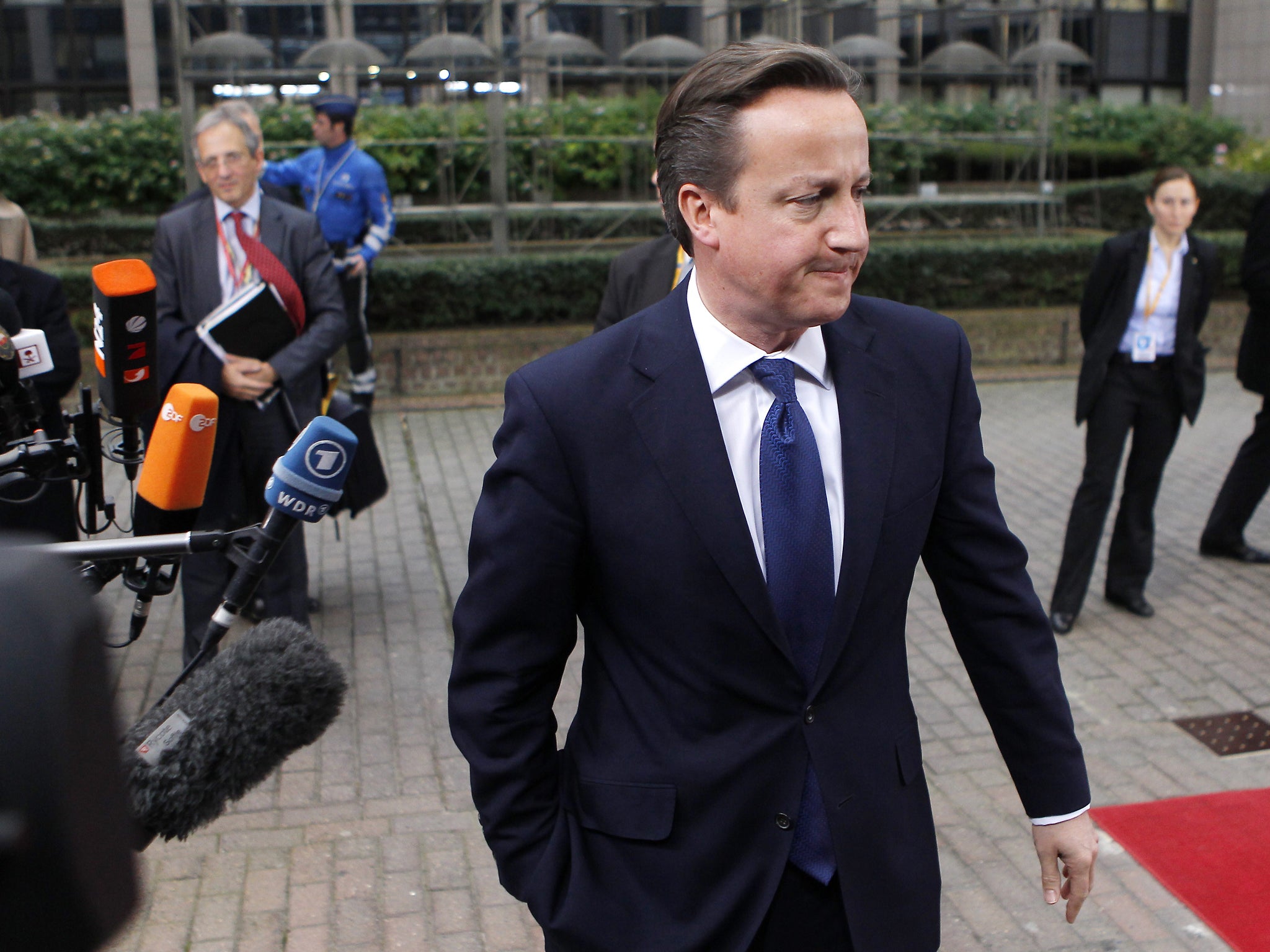Cameron may want to call a referendum, but he might not like what the public has to say
Unless the pro-EU brigadeis mobilised soon, its referendum campaign could be lost

In the next two months, David Cameron will make a long-awaited speech on Europe. He will dangle the prospect of a referendum on Britain’s relationship with the European Union, but not until after the 2015 general election. He will argue, rightly, that the EU will be a different animal after the eurozone turmoil, so it makes sense to see its final shape first.
The Prime Minister, it seems, wants the British public to vote on whether to accept the new terms of EU membership he negotiates. He hopes an imminent UK referendum will strengthen Britain’s hand in talks on a treaty enshrining the new Europe.
I am not sure about that. Germany and France don’t want a “Brexit”. But, talking to their officials in the margins of yesterday’s failed EU summit, I was struck how increasingly fed up they are with what they see as the UK’s self-centered, peripheral demands as they struggle with an existential crisis. The chances of Britain securing big wins like opting out of the social chapter of workers’ rights are described as “less than zero”. The days when Germany and France will go an extra mile to help Britain may be coming to an end. That is a dangerous moment. Mr Cameron insists he does not want the UK to leave the EU.
But with the opinion polls shifting markedly in favour of withdrawal in recent months, could he deny the public an “in/out” choice? The Eurosceptics have already dismissed his plan for a vote on renegotiated membership terms as an “in/in” referendum. Europhobic newspapers will join them in demanding an “in/out” one.
The Eurosceptics sense the wind in their sails. At a Bruges Group dinner this week to mark the 20th anniversary of the Tory rebellion against the Maastricht Treaty, attended by Cabinet ministers Owen Paterson and Theresa Villiers, calls for EU withdrawal were cheered. “The overwhelming feeling was that our time has finally come,” one MP said.
At his Brussels press conference last night, Mr Cameron launched a scathing attack on the Brussels bureaucracy, a soft target and a tactic only likely to fuel anti-European feeling at home. He has not been alone in failing to make a positive case for the Union. Last month Labour hopped into bed with the Tory sceptics, unable to resist the temptation of defeating the Government by calling for a cut in the EU budget for 2014-20. Pro-European Labour MPs, appalled at such opportunism, were assured that the unlikely dalliance with the Europhobes was only a one-night stand. I am not convinced. “Of course we would do it again,” one Labour insider whispered.
Ed Miliband made a broadly pro-European speech to the CBI’s annual conference on Monday. In a break with Blairite Europhiles, he argued that Labour needed to acknowledge the EU’s failings but promised business leaders he would join them in arguing the pro-EU case.
His speech, in effect, brought Labour into line with the Liberal Democrats’ “pro-Europe, pro-reform in Europe” position. Nick Clegg, a former European Commission official and MEP, is unfairly caricatured as loving everything that comes out of Brussels. He has dared to speak up for the EU but has also argued for reform.
“It took 15 years to decide on the definition of chocolate,” he recalls.
Mr Miliband was received better at the CBI than Mr Cameron, who told the EU to stop “picking the pockets” of its citizens –hardly language likely to make the British public feel more favourable towards EU membership. It’s a vicious circle: party leaders, anxious not to be on the wrong side of public opinion, pander to the Euroscepticism they have helped to fuel.
The CBI leadership, which has been pretty quiet on the EU front, was urged to raise its voice by some of its members. One company head, who is trying to rally business support, told me that many bosses are privately sympathetic but reluctant to put their head above the parapet. The best he can get is pledges to go public when the debate begins – presumably when we have a referendum. Although he believes 90 per cent of business leaders would back EU membership, the danger is that by then, it could be too late to turn back the Eurosceptic tide.
Mr Clegg shares such fears. He is appalled by Labour’s opportunism and Mr Cameron allowing Tory Cabinet ministers to speculate publicly that Britain could have a cost-free exit ticket from the EU, even though we would have little say over the rules of whatever trading relationship remained.
Mr Clegg is right to be worried. Unless the pro-EU brigade is mobilised soon, its referendum campaign could be lost before it begins. Although none of the three main party leaders wants it, Britain could already be on a slippery slope leading out of the EU.
Join our commenting forum
Join thought-provoking conversations, follow other Independent readers and see their replies
Comments
Bookmark popover
Removed from bookmarks